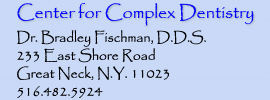 |
 |
Computerized Bite Analysis
NTI Suppression Device
Most of the symptoms of associated with Tempromandibular Dysfunction (TMD) are caused by muscle tightness and/or spasm, and injuries to teeth and bony structures due to clenching or grinding of the teeth. Typical symptoms include:
- Jaw pain particularly while chewing, biting, or yawning
- Earache without infection, pain sometimes spreads to face
- Headaches
- Soreness in front of ear
- A clicking or grinding noise when opening and closing the mouth
- Difficulty opening and closing your mouth
- A stiff jaw when eating, talking, or yawning
- Sensitive teeth without any signs of dental problems
- Aching on the side of the head and neck
- Neck, shoulder or back pain
- A burning sensation of the mouth/tongue
- Grinding or clenching your teeth
- Restricted range of jaw movement
- Locking of the jaw in an open or closed position
The tempromandibular joint is unique in that it is really two joints (right and left sides) and is the only joint in the body that both rotates and slides. Many muscles and nerves are involved in the fine motions of the jaw. All it takes is one muscle being injured by overuse or trauma and the whole apparatus can malfunction.
Tempromandibular dysfunction, TMD, is most commonly caused by overuse of the muscles associated with jaw motion. Physical and psychological stress are often associated with this over usage. This is understandable, consider the first thing you do when you are going to exert stress - like pushing a car stuck in the snow - you brace your body, first by setting your jaw, then your neck and back etc. Psychological stress appears to expressed physically in a similar manner.
Clinical examination and an understanding of the physical and psychological environment of the patient are critical for determining the course of treatment. Treatment can take many forms, the most common of which include bite guards, physiotherapy, relaxation techniques, biofeedback, adjustment of the bite relationships of the teeth, and sometimes medications.
It is important to note that most anatomical findings such as bony changes associated with arthritis, or a displaced disc may not be related to the pain being experienced by the patient. Since most discomfort is related to muscle spasm and overuse, it is important to avoid invasive (surgical) procedures until all non surgical routes have been exhausted.
If you are experiencing any of the above symptoms routinely, call for an appointment with Dr. Fischman now, the sooner treatment is begun, the easier a solution is found.
Dentures | Extreme Makeovers | Doctor's Credentials | Map & Policies | Contact Us
Home | Professional Referrals | Tidbits for Dentists | Newsletters for MDs